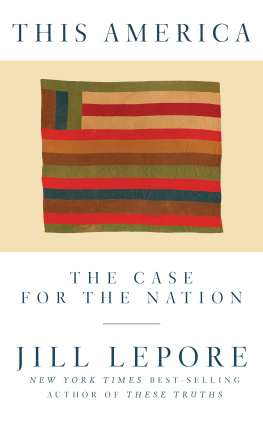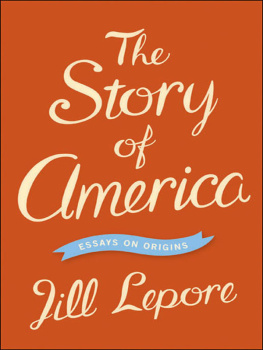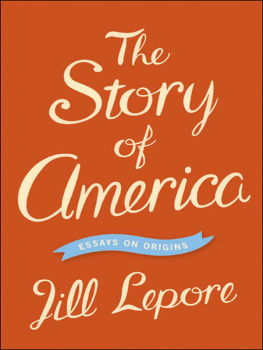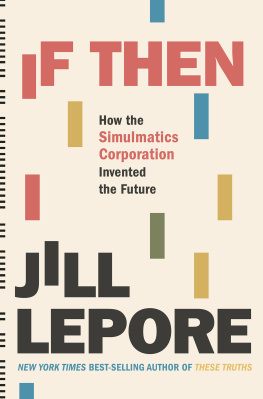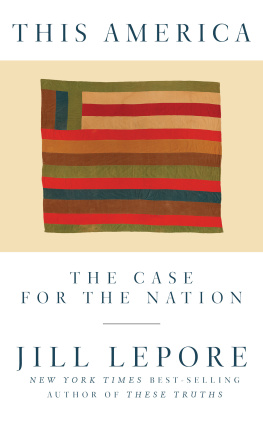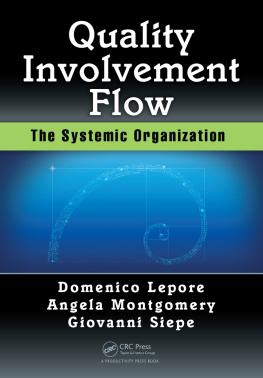
THIS
AMERICA
The Case for the Nation
J ILL L EPORE

LIVERIGHT PUBLISHING CORPORATION
A D IVISION OF W. W. N ORTON & C OMPANY
Independent Publishers Since 1923
N EW Y ORK L ONDON
In memory of my father,
whose immigrant parents
named him Amerigo in 1924,
the year Congress passed a law
banning immigrants like them
Nations reel and stagger on their way; they
make hideous mistakes; they commit frightful
wrongs; they do great and beautiful things.
And shall we not best guide humanity by
telling the truth about all this, so far as the
truth is ascertainable?
W. E. B. DuBois,
The Propaganda of History, 1935
T HIS LITTLE BOOK undertakes three outsized tasks, things that havent been done much lately, things that seemed to me in need of doing. It explains the origins of nations. It offers a brief history of American nationalism. And it makes the case for the nation, and for the enduring importance of the United States and of American civic ideals, by arguing against nationalism, and for liberalism.
A long essay, really, this book is at once an argument and a plea, a reckoning with American history, the nation at its worst, and a call for a new Americanism, as tough-minded and openhearted as the nation at its best.
THIS AMERICA
I
HISTORY AND NATIONS
Nations are made up of people but held together by history, like wattle and daub or lath and plaster or bricks and mortar. For a generation, American history has been coming undone and the nation has been coming apart, the daub cracking, the plaster buckling, the mortar crumbling. This tragedy was foreseen.
In 1986, the Pulitzer Prizewinning, bow-tie-wearing Stanford historian Carl N. Degler delivered something other than the usual pipe-smoking, Scotch-on-the-rocks after-dinner disquisition that had plagued the evening program of the annual meeting of the American Historical Association for nearly all of its century-long history. Instead, Degler, a gentle and quietly heroic man, accused his colleagues of nothing short of dereliction of duty: appalled by nationalism, they had abandoned the study of the nation.
We can write history that implicitly denies or ignores the nation-state, but it would be a history that flew in the face of what people who live in a nation-state require and demand, Degler said that night, in Chicago, in a speech titled In Pursuit of an American History. He issued a warning: If we historians fail to provide a nationally defined history, others less critical and less informed will take over the job for us.
Degler was worried about his contemporaries, intellectuals who had stopped studying the nation, believing that the nation-state was on the decline. The world had grown global, tied together by intricate webs of trade and accelerating forms of transportation and communication. The future was cosmopolitan, they insisted, not provincial. Why bother to study the nation?
Many of Deglers contemporaries also believed that studying the nation would prop up nationalism, which ought, instead, be left to die. By the last quarter of the twentieth century nationalism was, outside of postcolonial states, nearly dead, a stumbling, ghastly wraith. And many intellectuals believed that if they stopped writing national history, nationalism would die sooner, starved, neglected, deserted, a fitting death for a war criminal, destroyer of worlds.
Francis Fukuyamas much-read 1989 essay The End of History? appeared three years after Degler delivered his speech, but it remains the best-known illustration of the wisdom of Deglers warning. At the end of the Cold War, Fukuyama announced that fascism and communism were dead and that nationalism, seemingly all but the last threat to liberalism left standing, was utterly decrepit in Europe (European nationalism has been defanged) and that, where it was still kicking in other parts of the world, well, that wasnt quite nationalism: it was a halting striving for democracy.
But nationalism did not die. It ravaged Bosnia and Rwanda. It carried to positions of influence and power, even murderous power, nationalists including Vladimir Putin in Russia, Recep Tayyip Erdoan in Turkey, Viktor Orbn in Hungary, Marine Le Pen in France, Jaroslaw Kaczynski in Poland, and Rodrigo Duterte in the Philippines. Three decades after Degler issued his warning, Britain voted to leave the European Union and the United States elected Donald Trump, who went on to declare, Im a nationalist, okay? In a new book, Fukuyama retreated from many of his earlier claims, insisting that in 1989 he had never exactly said that nationalism was about to disappear. But Fukuyama had been hardly alone in pronouncing nationalism all but dead in the 1980s. A lot of other people had, too. Thats what troubled Carl Degler. Degler didnt think nationalism was about to go away, and he was worried that if intellectuals kept thinking it would, theyd keep ignoring it, and theyd not only fail to fight it, theyd lose the ability to fight it, like a boxer out of training, flabby, slow-footed, and fainthearted.
Nation-states, when they form, imagine a past. Modern historical writing arose with the nation-state. So did modern liberalism. From the founding of the United States until the 1960s, the subject of American history was the study of the American nation. Over that same stretch of time, the United States waged wars of conquest across the continent, fell into a civil war, fought two world wars, and entered a cold war, while a people held in bondage fought for their emancipation only to face a legal regime of segregation and a vigilante campaign of terrorism, leading to a decades-long struggle for civil rights, even as the United States became the leader of a liberal world order. If American historians didnt always succeed in affirming a common history during these tumultuous yearsand they didntthey nevertheless engaged in the struggle, offering appraisals and critiques of national aims and ends, advancing arguments, fostering debate, defending democracy, and celebrating, often lyrically, the beauty of the land, the inventiveness of the people, and the vitality of American ideals. And so, each in a different way, did the people left out of those national histories, women and people of color who fought for freedom and sovereignty and citizenship and equality and justice, and who also fought their way into the academy.
In the 1970s, the historical profession broadened; so did American history. Studying the nation fell out of favor. Instead, most academic historians looked at either smaller or bigger things, investigating groupsdivided by race, sex, or classor taking the vantage promised by global history. They produced excellent scholarship, meticulously researched and brilliantly argued accounts of the lives and struggles and triumphs of Americans that earlier generations of historians had ignored. They studied peoples within nations and ties across nations. And, appalled by nationalism, they disavowed national history, as nationalisms handmaiden. But when scholars stopped writing national history, other, less scrupulous people stepped in.
Nations, to make sense of themselves, need some kind of agreed-upon past. They can get it from scholars or they can get it from demagogues, but get it they will. The endurance of nationalism proves that theres never any shortage of fiends and frauds willing to prop up peoples sense of themselves and their destiny with a tissue of myths and prophecies, prejudices and hatreds, or to pour out the contents of old rubbish bags full of festering incitements, resentments, and calls to violence. When serious historians abandon the study of the nation, when scholars stop trying to write a common history for a people, nationalism doesnt die. Instead, it eats liberalism.
Next page
